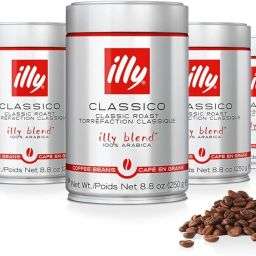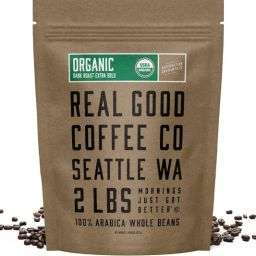
Freezing coffee beans before grinding has emerged as a nuanced approach to enhancing the coffee brewing process. This method not only preserves the freshness of coffee beans but also contributes significantly to the flavor profile of the brewed coffee. By freezing, the beans undergo a state that facilitates a more uniform grind, leading to a consistent extraction and, ultimately, a superior cup of coffee.
Why Freeze Coffee Beans?
Enhancing Flavor and Consistency
The primary advantage of freezing coffee beans before grinding is the notable improvement in flavor and consistency. According to the Barista Institute and Tasting Table, freezing beans before grinding results in more uniform particle size distribution.
This uniformity is crucial as it leads to less fine and boulder-sized particles, enabling a finer grind that increases extraction efficiency. Consequently, coffee brewed from frozen beans tends to be sweeter, less bitter, and less acidic, enhancing the overall taste experience.
Reducing Waste and Extending Shelf Life
Another compelling reason to freeze coffee beans is the significant reduction in waste and extension of the beans’ shelf life. Coffee Bros. and Caffe Streets highlight that, unlike beans stored at room temperature, which quickly lose their freshness, freezing coffee beans slows down the degradation process.
This method effectively preserves the beans’ inherent qualities, allowing coffee enthusiasts to enjoy their favorite brews without compromise over extended periods. The process not only conserves the beans but also supports sustainable consumption by minimizing waste.
The Science Behind Freezing Coffee Beans
The scientific rationale for freezing coffee beans centers around the impact of low temperatures on the beans’ moisture levels and flavor profile. Coffee Bros. and Coffeefires.com elucidate that freezing alters the physical state of the moisture within the beans, preventing the staling process that typically occurs due to oxidation and moisture absorption at room temperature.
Moreover, the cold environment stabilizes the beans’ volatile compounds, which are responsible for their aroma and flavor, ensuring these essential characteristics are preserved until the beans are ground and brewed. This scientific approach underscores the effectiveness of freezing in maintaining the freshness and enhancing the quality of coffee.
Best Practices for Packaging and Storage
To ensure the freshness and quality of coffee beans, proper packaging and storage before freezing are paramount. According to Kitchen House Coffee, Tips Bulletin, and Coffeefires.com, the beans should be placed in airtight containers or freezer bags to prevent moisture absorption and oxidation.
Removing as much air as possible from the container is crucial to minimize the risk of freezer burn and flavor degradation. For those looking for a more sustainable option, reusable vacuum-sealed containers offer an effective solution to preserve the beans’ integrity.
Optimal Freezer Settings and Containers
Coffeefires.com advises setting the freezer temperature between -18°C and -23°C (-0.4°F and -9.4°F) for optimal preservation of coffee beans. It’s essential to use containers that are not only airtight but also opaque if possible, to shield the beans from light, which can further degrade their quality. Glass jars or specialized coffee storage bags with a valve are recommended for their ability to maintain a stable environment within.
Thawing Process for Optimal Flavor
The proper thawing of coffee beans is crucial for preserving their flavor. Coffeefires.com recommends removing the desired amount of coffee beans from the freezer and allowing them to thaw at room temperature before grinding. This process ensures that the beans do not absorb excess moisture, which can negatively impact the grinding process and, consequently, the taste of the coffee.
Grinding Tips for Frozen Beans
For the best grind from frozen beans, insights from Caffe Streets and CoffeeYak! suggest that beans should be ground while still cold to take advantage of their brittle nature, which leads to a more uniform particle size. However, it’s important to adjust the grinder settings if necessary, as frozen beans may require a different grind size compared to beans at room temperature.
Common Misconceptions and Mistakes
A common misconception addressed by Coffee Bros. is that freezing coffee beans is detrimental to their flavor. On the contrary, when done correctly, freezing can preserve the freshness and enhance the flavor profile of the beans. The key mistake to avoid is exposing the beans to air and moisture, which can occur if they are not stored in airtight containers or if they are thawed and refrozen multiple times.
Adhering to the recommended practices for freezing, thawing, and grinding ensures that coffee enthusiasts can enjoy a premium cup of coffee anytime.
FAQs
Can You Freeze Coffee Beans Right After Roasting?
Yes, you can freeze coffee beans immediately after roasting to preserve their freshness and flavor for an extended period. The process of freezing slows down the oxidation, which is a key factor in the staling of coffee beans. However, it’s crucial to store the beans in airtight containers or bags to prevent moisture and odors from compromising their taste. When ready to use, thaw the beans completely before grinding to ensure the best flavor extraction.
How Long Can Coffee Beans Be Frozen?
Coffee beans can be stored in the freezer for up to two years without significant degradation of flavor and quality. The key to achieving this longevity is proper storage—using airtight containers or vacuum-sealed bags to protect the beans from freezer burn and moisture. Labeling the containers with the freezing date can also help track freshness and ensure you’re enjoying your coffee at its best.
Conclusion
Freezing coffee beans before grinding offers a practical way to extend their freshness, enhance flavor consistency, and reduce waste. By adhering to best practices for packaging, storage, and thawing, coffee enthusiasts can enjoy a premium brewing experience.
Properly frozen beans maintain their quality, offering a sweeter, less bitter, and more flavorful cup. Embrace the science and guidelines behind freezing coffee beans to unlock the full potential of your coffee ritual.









